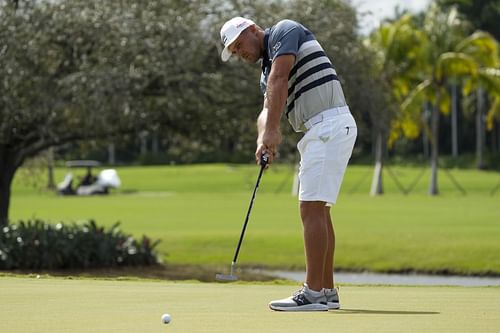
Bryson DeChambeau calls out ‘most unimaginative’ new golf ball rule change
Bryson DeChambeau is firmly opposed to the new golf ball changes. The proposed rule change hasn't been universally accepted by golfers, and DeChambeau is among its biggest detractors.
The LIV Golf star was blunt when asked about the new ball rule, which he referred to as unimaginative. The USGA and R&A presented a proposal to create a shorter golf ball on March 14, which has drawn mixed responses.
DeChambeau didn't mince his words as he said (via Golf.com):
“I think it’s the most unimaginative, uninspiring, game-cutting thing you could do. Everybody wants to see people hit it farther. That’s part of the reason why a lot of people like what I do. It’s part of the reason a lot of people don’t like what I do.”
The 29-year-old added that he doesn't believe it's fair to golfers who have learned how to hit the ball further:
“It’s a great handicap for us guys that have worked really hard to learn how to hit it farther. I think it’s the most atrocious thing that you could possibly do to the game of golf. It’s not about rolling golf balls back; it’s about making golf courses more difficult.”
DeChambeau stated that he wants the playing field to be equal and that if someone is better at driving the ball than others, then that's fine. He said:
“If you could say I’m the complete opposite times 1,000, that’s what I would be. I’m all about equality. I’m not about equity on this front.”
Bryson DeChambeau made these comments ahead of the LIV event in Tucson, Arizona. It remains to be seen how the PGA Tour and LIV Golf will respond to this if it moves past the proposal stage.
What golf ball rules is Bryson DeChambeau angry about?
The proposed rule change would introduce a new ball that would effectively limit how far people could drive it. The governing bodies believe it would reduce the strongest drivers' distances by about 15 yards.

Mike Whan, the USGA’s chief executive officer, said in a press release via TSN that changing the ball is not a new thing:
"Hitting distances at the elite level of the game have consistently increased over the past 20, 40, and 60 years. It’s been two decades since we last revisited out testing standards for ball distances."
The statement continued:
"Predictable, continued increase will become a significant issue for the next generation if not addressed soon. The MLR we are proposing is simple to implement, forward-looking and does so without any impact on the recreational game. We are taking the next steps in this process, guided first and foremost by doing what’s right for the entire game."
In the meantime, expect golfers (especially those who excel at driving the ball) to speak out in opposition to the new rule. It isn't in place yet, so it's possible that a public outcry could convince those in charge not to accept the proposal.
Driving can be a distinct advantage, but these new rules would effectively level the playing field.